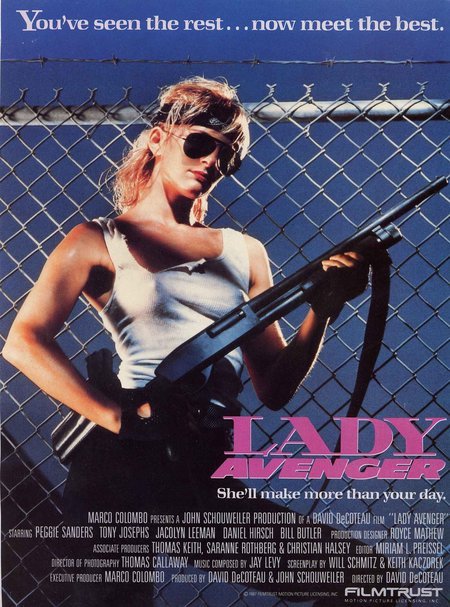Matty bows before David DeCoteau’s violent femme.
David DeCoteau loves ballsy and formidable female characters. His filmography teems with them, from the eponymous Sorority Babes in the Slimeball Bowl-O-Rama (1988) and Nightmare Sisters (1988), to the gals at the centre of his most recent offerings, all those devilish Wrong something-or-other thrillers he keeps crafting for Lifetime.
“Women are not victims in my movies,” DeCoteau told Horrorfan in 1989. “Women are the aggressors in my movies. They’re the ones that save the day.” [1]
And within DeCoteau’s mammoth oeuvre, there’s no more ballsy and formidable a female than Peggy McIntaggart’s titular LADY AVENGER.
Bereavement, a wild youth, broken relationships — McIntaggart’s Maggie has already dealt with a lot in her twentysomething years, even prior to being locked up after taking the rap for one of her equally troubled younger brother’s crimes. And yet, despite her hardened exterior, there’s a tremendous amount of vulnerability to her. A wonderful complicated mass of contradictions, Maggie is simultaneously ruthless, moralistic, and fiercely protective of her kin, and rash, morally skewed, and deeply insecure of her place in her fractured family; a splintered unit rounded out by her fraught mother, Mary (Jacolyn Leeman), and her devious and controlling stepfather, Jack (Tony Josephs). As penned by Will Schmitz and Keith Kaczorek, throughout Lady Avenger’s script — a work that, though by the numbers in terms of dialogue and plot development, lays a solid enough footing for DeCoteau to build a brilliant Death Wish (1974)-tipping programmer [2] — there’s a powerful sense that Maggie doesn’t quite know how to deal with the problems in her life. Thus, the easiest and most relatable thing she can do is to revert to the bad-ass image she’s cultivated for herself.
The story is kicked into gear by the murder of Maggie’s brother and the rape of his girlfriend (a sequence that was pruned by the BBFC for Lady Avenger’s U.K. video debut via Palace, along with a further minute-and-a-half of violence). Granted day release to attend the funeral, Maggie escapes the stewardship of her guard and embarks on a crusade of vengeance, her bloodthirsty quest leading to a well-telegraphed but nonetheless stirring denouement that hits closer to home than she initially thought — an appropriately meaty close that forces her to confront her issues head on.
Touching upon themes of loss, redemption, and gaslighting, Lady Avenger is at once a potent poverty row action caper and an effective domestic drama. Juxtaposing sun-soaked Los Angeles climes with his gritty, matter-of-fact direction, DeCoteau succeeds in balancing the film’s seemingly disparate elements. His consummately assembled scenes of action are thumpy and entertaining as Maggie slaughters a slew of men — all of whom are either creeps, lowlifes, and scumbags — but they never eclipse his emotional grounding. DeCoteau pals William Butler and Michelle Bauer appear in the cast (the latter supplying plenty of skin), and the ace track Savage Streets by Rainey Hayes (a cut previously used in Norman Thaddeus Vane’s Club Life (1985), and most famously performed by Hayes in the first original Playboy Home Video production, Girls of Rock & Roll (1985)) provides a nice, Greek chorus-y bookend over the front and back credits.
The star, mind, is McIntaggart. While her delivery is a touch wooden on a couple of occasions, DeCoteau wisely plays to the future Playmate of the Month’s (January 1990, fellow raincoat brigaders) strengths and ensures it’s her mere presence that’s Lady Avenger’s immediate hook. Put it this way, there’s a reason she’s slathered across the film’s key art. Wearing a bandana, a pair of sunglasses, and a fitted white vest, McIntaggart is an iconic sight to behold. Her intensely physical charisma is electric, and her fearless, small-dog-big-bite demeanour is both believable and deceptively imposing. As such, prosaic claptrap a la diction and cadence are irrelevant in a hearty exploiter like this; McIntaggart conveys greater raw energy and honest pathos with the cock of a pistol than many a so-called ‘better’ actor can with reams of deadening exposition.
Produced by DeCoteau and frequent collaborator John Schouweiler in conjunction with former Filmtrust co-founder Marco Columbo. Columbo would go on to produce Schouweiler and DeCoteau’s Ghetto Blaster (1989) and twenty-six subsequent DeCoteau flicks, notably the 1313 series and Bigfoot vs. D.B. Cooper (2016).
USA ● 1988 ● Action, Thriller ● 81mins
Peggy McIntaggart (as ‘Peggy Sanders’), Tony Josephs, William Butler, Michelle Bauer (as ‘Michelle McClellan’) ● Dir. David DeCoteau ● Wri. Will Schmitz and Keith Kaczorek

[1] Interview with Bill George, Horrorfan, Vol. 1, No. 3, Fall 1989
[2] And a work that, according to Schmitz, belongs solely to Kaczorek and DeCoteau. Schmitz, who’d previously penned an early, unused iteration of Creepozoids (1987), then called ‘Mutant Spawn 2000’, for DeCoteau, conceived Lady Avenger under the title ‘One Woman Death Machine’ and insists the finished film bears little resemblance to the draft he first turned in.

